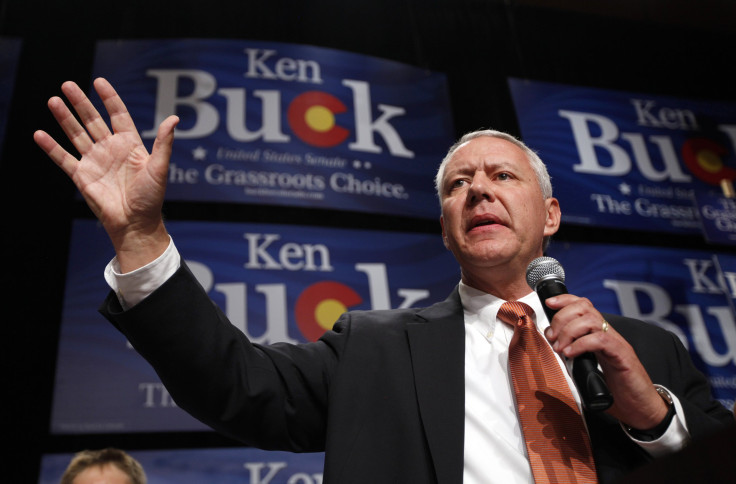Trump Is Right To Hire Billionaires To Fix Washington Corruption, Republican Congressman Says

As historic amounts of money have flooded into politics in recent years, polls have shown that the public sees Congress as out of touch with America — and wildly corrupt. Republican Congressman Ken Buck seems to agree; his new book is called “Drain the Swamp: How Washington Corruption Is Worse Than You Think.”
Buck started his career as an aide to then-Rep. Dick Cheney and also worked at the Justice Department. With his years of experience in Washington, he may look like the epitome of what he is now lamenting. He has raised millions of dollars for his campaigns, including in D.C. from political action committees when Congress is in session. He has voted to support legislation that helps his donors’ industries. For instance, according to the nonpartisan Center for Responsive Politics, Buck has raised more than a quarter of a million dollars from donors in the securities and investment industry and recently voted for a Wall Street-backed bill to repeal regulations passed in the wake of the 2008 financial crisis. Buck has received more than $392,000 from donors in the oil and gas industry and has voted for legislation to promote oil exports and support pipeline development.
But in a recent podcast interview with International Business Times’ David Sirota, Buck argued that there is a difference between “ideological fundraising” and “transactional fundraising.” He contended that President Trump’s promise to “drain the swamp” is not inconsistent with him appointing billionaires to government positions that regulate those billionaires’ industries.
Podcast subscribers can listen to the entire interview by clicking here. What follows is a lightly edited excerpt of the podcast discussion.
Buck: What caused me to want to write this book was that I realized pretty quickly that the incentive structure in Congress is wrong, and that a freshman member wasn't going to be able to do a whole lot to change that. I wrote this book to try to inform the American public about what's going on in Congress and to try to get some action on changing the structure, the incentives, the process there.
Sirota: You talk a lot about how money and fundraising is linked to advancement in Congress. How does that get changed?
Buck: It gets changed in a few ways. First, constitutionally, we need to have a convention of the states and we need to get a balanced budget amendment and term limits. I don't believe that Congress will ever limit its ability to spend money. I don't believe Congress will ever limit the time that members can spend in Congress. If that's going to happen, it’s going to happen with the second kind of amendment process that we have in the Constitution in Article 5, where the states petition Congress and they hold a convention of the states. The language is passed and ratified by three quarters of the states. Those two things, I think, change the structure in Congress.
I think we have to have ethics rules that prohibit the pay-to-play system that we have, where members have to pay to be on a committee or to be a chairman of a committee. I think we need to really encourage President Trump in his efforts to limit the gross abuse of spending in the executive branch, and I think he's done a good job with a lot of his cabinet picks to start that process.
Sirota: People might look at your campaign finance reports and note that you, for instance, have raised hundreds of thousand of dollars from donors in the oil and gas industry while you’ve voted to support that industry. Doesn’t that exemplify the very problem you are criticizing?
Buck: I think there are two kinds of fundraising. One is ideological fundraising. That is, if someone agrees with my views, generally on the second amendment or on the role of government in our society, or on so many other issues, they may donate money to me because they know I'm going to go back to D.C., I'm going to look at the facts, and I'm going to make the same kind of judgments that they would make on these issues.
The other kind of fundraising is transactional fundraising, and that's the fundraising I think Americans find offensive. People realize that there's going to be money in politics. It takes money to run a campaign. There are a lot of small donor committees out there, there are a lot of efforts to raise money from hardworking Americans who are not rich. But the transactional fundraising, where there is a link between somebody who donates money and a bill that is in front of that committee that week, or in front of that committee that month, I think that's offensive and I think Americans find that offensive.
Sirota: How can we distinguish between what you call ideological fundraising and what you call transactional fundraising?
Buck: I think that the timing of the vote, any understanding that is created. When you look at the transportation bill that goes in front of the transportation infrastructure committee, the money that is donated to members on that committee around the time that that vote is taken dramatically increases. That's the kind of situation where it raises a red flag and you wonder, "Are members getting money because they're supposed to support something for a special interest group?" The general donations that I've received and the members that I know about have received are campaign contributions that are received during the process of campaigning. They aren't linked to, by timing or issue, a particular vote.
Sirota: How is the average voter supposed to know whether donations are a quid pro quo or not?
Buck: There obviously are a number of watchdog groups in Washington, D.C. There are groups that are specifically looking at donations and what is put in certain bills. If there is a vote on an omnibus bill that's 1,200 pages long and has trillions of dollars of spending and there is a carve-out for a particular pharmaceutical company that extends a patent, for example ... I talk about an example in my book ... That process, that donation, that insertion of that advantage for that corporation, watchdog groups are looking at that, they're publicizing that. It's the kind of thing that I talk about with the transactional giving.
Sirota: President Trump campaigned on a promise to "drain the swamp", but we have seen him appoint corporate executives to government offices. Some people say that looks like the opposite of draining the swamp. What do you say?
Buck: I think that when you're talking about taking an individual from the private sector who is not just used to balancing a business's accounts but is actually creating profit, they can look at a government agency and they can figure out ways not to be creating the kind of debt that we have in this country. We are $20 trillion of debt, $100 trillion of unfunded liabilities. Last year we had $600 billion deficit in government. We don't have a major war going on. We don't have a major recession. $600 billion is absolutely ridiculous, so I'm hoping that these business executives have a different view of government and the responsibility of government than the folks that come from government to run agencies.
Sirota: Some of the business executives who have become government officials have ties to the very industries that they are regulating. Critics have said that represents potential conflicts of interest. Do you disagree?
Buck: I think it is a lot more comfortable life to be running a major corporation than to be working in government, and I think these individuals are working in government for the right reasons, not because they need any more money or they want any more money, but because they have a patriotic passion to help this country. At least that's what I hope. We'll find out in a few years, but I don't see that conflict of interest is as real as it is created for political purposes.
Sirota: Do you think ethics regulators have been tough enough in making sure the Trump administration and Congress are following ethics rules?
Buck: I talk about the conflicts that are inherent in Congress, where I've served for the last two years. I think that it is a situation where we have a bipartisan agreement for folks to look the other way. It is really an incumbent problem, where a system has been created to promote incumbency and not competition in the campaign world. I think that the enforcement on the congressional side is there if we change some of the rules to make sure that we're looking for the right things.
Sirota: You support term limits. Are you willing to take a term limits pledge yourself?
Buck: I think that many of my constituents, far more than a majority, believe that we need term limits in Congress. We're not going to get them through Congress. We're going to have to use what I mentioned, this convention of states. I am not taking a term limits pledge, although I have told my constituents I'm not planning on spending a whole lot of time in Congress. I think that when people who are in favor of term limits term limit themselves, then the people who are left are the ones who are not in favor of term limits and there's even less chance of something getting done in that situation. I think it's counter-productive for people who are in favor of term limits to term limit themselves.
© Copyright IBTimes 2024. All rights reserved.












